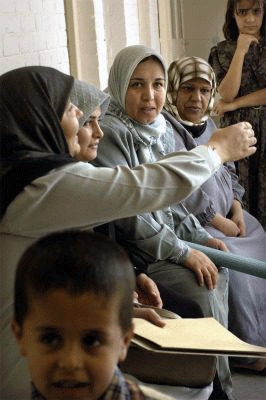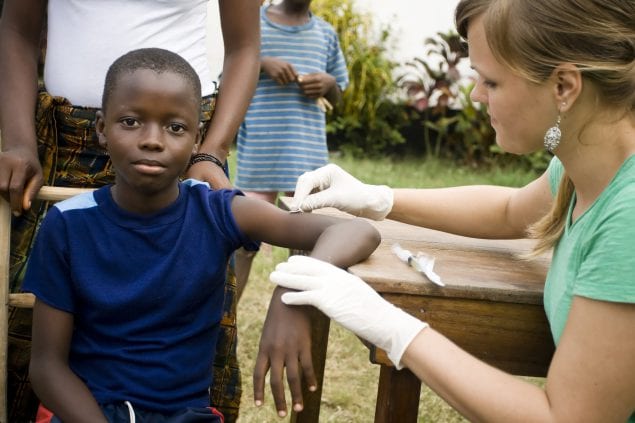Ensuring Healthy Migration Worldwide

Women waiting on a bench at Al-Arafa clinic
CDC’s Division of Global Migration Health (DGMH) works to promote and improve the health of immigrants, refugees, and migrants by preventing the importation of infectious diseases into the United States when these groups enter the United States or cross other international borders. Additionally, DGMH provides the Department of State (DOS) and the Department of Homeland Security U.S. Citizenship and Immigration Services (USCIS) with Technical Instructions for all physicians performing overseas and U.S.-based medical screening examinations for immigrants and refugees. The Technical Instructions outline the scope of the medical examination.
These instructions are developed in accordance with Section 212(a)(1)(A) of the Immigration and Nationality Act (INA), which outlines conditions that would make a person ineligible for a visa or admission to the United States based on health-related grounds. Four medical conditions may cause an applicant to be inadmissible on health-related grounds:
- Having a communicable disease of public health significance
- Failure to present documentation of having received vaccination against specified vaccine-preventable diseases
- Having (or having had) a physical or mental disorder with associated harmful behavior, and
- Drug abuse or addiction.
Medical Exams

A medical examination is mandatory for all persons outside the U.S. applying for an immigrant visa and all refugees coming to the United States. Outside the U.S., medical examinations are performed by more than 760 physicians (called panel physicians). Panel physicians are selected by the Department of State (DOS).
Persons applying for nonimmigrant visas (temporary admission) may also be required to undergo a medical examination at the consular officer’s discretion if there is reason to suspect that an inadmissible health-related condition exists.
Persons in the United States who apply for adjustment of their immigration status to that of lawful permanent resident are also required to be medically examined. In the U.S., medical examinations are performed by approximately 5,000 physicians (called civil surgeons). Civil surgeons are designated by U.S. Citizenship and Immigration Services (USCIS).
Communicable Diseases of Public Health Significance
Applicants who have communicable diseases of public health significance are inadmissible. These currently include:
- Gonorrhea
- Hansen’s disease, infectious
- Syphilis, infectious
- Tuberculosis, active
And the following two disease categories:
- Quarantinable communicable diseases designated by Presidential Executive Order. Current diseases on this list include cholera, diphtheria, infectious tuberculosis, measles, plague, smallpox, yellow fever, viral hemorrhagic fevers (such as Ebola, Lassa, and Marburg), severe acute respiratory syndromes (COVID-19, Middle East respiratory syndrome, SARS), and influenza caused by novel or re-emergent influenza (pandemic flu)
- Events that are reportable as a public health emergency of international concern (PHEIC) to the World Health Organization (WHO) under the International Health Regulations (IHR) of 2005 (currently COVID-19, polio, smallpox, SARS, pandemic influenza, and other public health emergencies of international concern)
Vaccine-Preventable Diseases

Vaccines protect against a range of serious diseases. Under the immigration laws of the United States, immigrant applicants are required to receive certain vaccinations, including vaccinations against vaccine-preventable diseases recommended by the Advisory Committee for Immunization Practices. Note that each set of Technical Instructions for the medical examination of applicants has an addendum regarding the vaccination requirements for immigrants. These currently include:
- COVID-19
- Diphtheria
- Haemophilus influenzae Type B
- Hepatitis A
- Hepatitis B
- Influenza
- Measles
- Meningocococcal disease
- Mumps
- Pertussis
- Pneumococcal pneumonia
- Polio
- Rotavirus
- Rubella
- Tetanus
- Varicella
Medical Waivers
In some exceptional cases, applicants may apply for a medical waiver for some health-related conditions. These waivers based on a health-related condition are approved or denied by USCIS. For applicants applying for a waiver when they have an inadmissible condition, USCIS will send DGMH health-related waiver forms (USCIS form, I-601 and I-602). DGMH will review the forms and medical reports for these applicants submitted by DOS consular officers and panel physicians. DGMH also reviews these documents for applicants in the United States applying for adjustment of status submitted by USCIS officers and civil surgeons. DGMH then forwards the results of the review to USCIS.

Any applicants requesting a health waiver must be seen at a facility or by a physician for a medical evaluation within thirty (30) days of their arrival or adjustment of status in the U.S. DGMH will review the waiver form to verify the identification of the facility or physician to perform this required exam. In some cases, DGMH may forward CDC form 4.221-1 to the requesting office to make this identification. If necessary, the requesting office may forward CDC form 4.422-1 to the applicant or the applicant’s sponsor in the U.S. for completion prior to the applicant being granted a health-related waiver.
The waiver based on a health-related condition is approved or denied by USCIS. DGMH does not make this decision. For further information on requirements for waiver on health-related grounds, see the USCIS page.
- Visit the Immigrant and Refugee Health fact sheet on the Division of Global Migration Health website to learn more about the Immigrant and Refugee Health Branch, what we do and where we work.